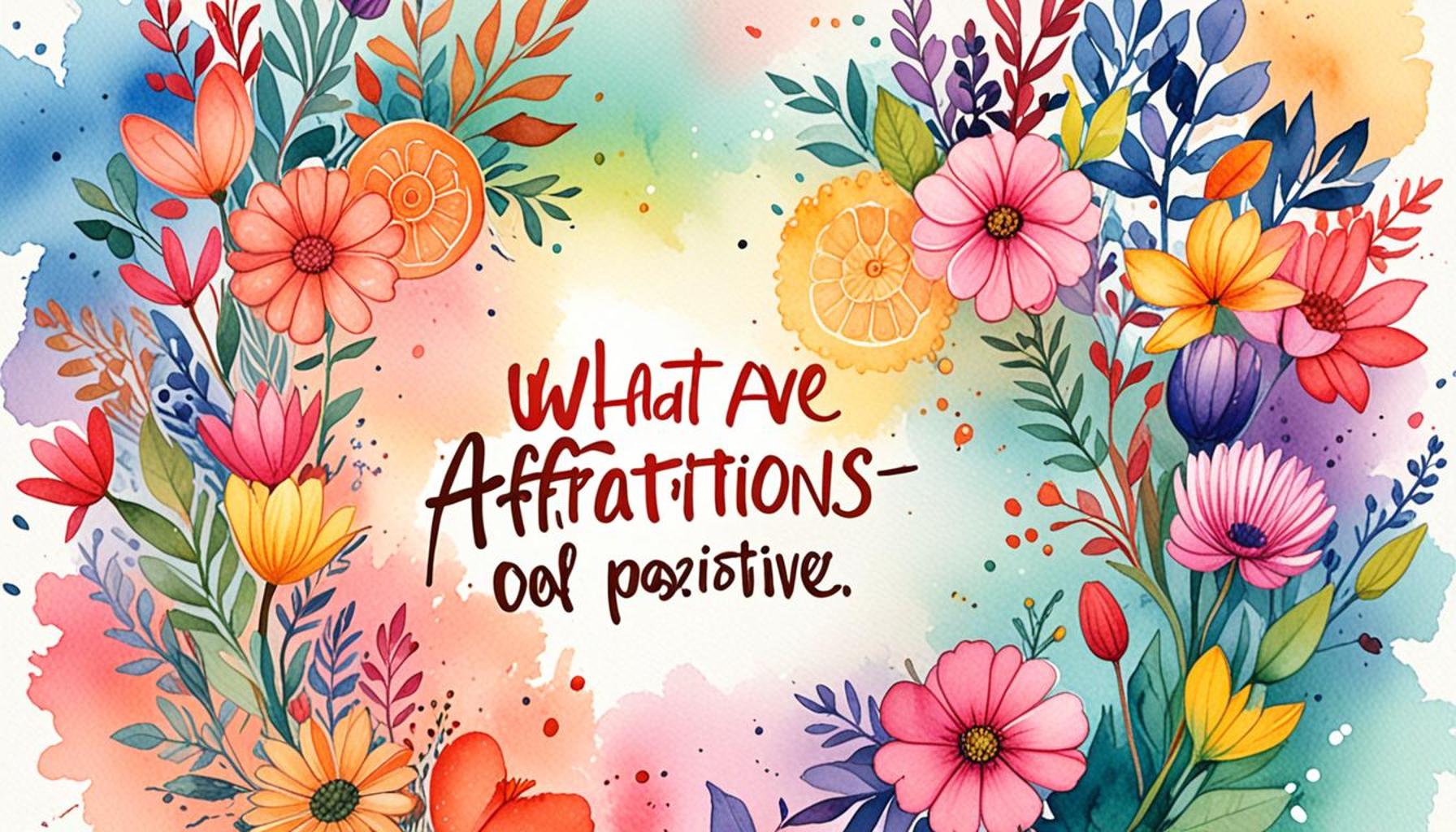Positive Affirmations to Combat Negative Thoughts Effectively

Understanding Negative Thoughts
Negative thoughts can often take root in our minds, sprouting feelings of anxiety, self-doubt, and despair. This is particularly relevant in challenging environments like Nigeria, which faces a range of societal issues, economic hurdles, and cultural expectations. As pressures mount from various directions—be it financial responsibilities, job instability, or family expectations—the need for effective coping mechanisms becomes crucial.
The Role of Positive Affirmations
One of the most effective strategies emerging in mental health discussions is the use of positive affirmations. These are simple statements that individuals can repeat to themselves to challenge and counteract negative thoughts. The beauty of positive affirmations lies in their simplicity; they require no special skills or lengthy commitments, making them accessible to everyone. Affirmations can reshape our mindset in remarkable ways, transforming how we see ourselves and the world around us.
Key Benefits of Positive Affirmations
There are several significant benefits associated with the regular practice of positive affirmations:
- Boosts self-esteem: Engaging in affirmations like “I am worthy of love and respect” can gradually foster a stronger self-image. This is especially important in a society where external factors can heavily influence self-worth.
- Reduces stress: Using affirmations can serve as a mental refuge, bringing forth a wave of calm in moments of anxiety. Statements such as “I am in control of my thoughts and feelings” can create a more tranquil mental state.
- Encourages a growth mindset: Affirmations like “Every challenge I face is an opportunity to grow” promote resilience and the ability to adapt in a rapidly changing environment.
Implementation in Daily Life
For many Nigerians, adopting positive affirmations can act as a powerful lifeline in turbulent times. By nurturing self-love and fostering a positive outlook, individuals can actively reclaim control over their minds. Incorporating affirmations into daily life can be simple yet transformative. For instance, many people may find it beneficial to write their favorite affirmations on sticky notes and place them around their living spaces. This not only serves as a constant reminder but also creates a supportive atmosphere filled with positivity.
Furthermore, introducing affirmations during morning routines can set a positive tone for the day. Phrases like “I am capable of achieving my goals” or “I attract positivity and success” can infuse daily activities with confidence and motivation.

In summary, the power of positive affirmations is profound and can create not just personal change but societal ripples. Adopting such practices can contribute to a more supportive and resilient community, urging individuals to build a future filled with hope and positivity despite the challenges faced in their daily lives.
SEE ALSO: Click here to read another article
The Science Behind Positive Affirmations
The practice of positive affirmations is not merely a New Age phenomenon; it is deeply entrenched in the field of psychology. Numerous studies have revealed that repeating positive statements can profoundly influence our mental well-being. Research published in the journal “Psychological Science” indicates that engaging in positive self-affirmation can alter the neural pathways in our brains, making it easier to cultivate a more optimistic outlook. This shift in mindset can be especially valuable in environments marked by significant stressors, such as the ones often encountered in Nigeria, where social, economic, and political pressures can weigh heavily on individuals.
When we regularly engage in positive affirmations, we actively challenge and reshape the cognitive patterns that underpin negative thoughts. In Nigeria, a nation rich in diversity yet often beset by challenges like economic hardship or ethnic tensions, many individuals grapple with feelings of inadequacy or defeat. Affirmations serve as a vital counterbalance to these pervasive societal narratives, promoting messages of strength, resilience, and self-worth. For instance, affirmations such as “I am strong and capable” or “I belong in spaces where my contributions matter” empower individuals to reconnect with their inherent value, fostering a sense of belonging and identity amidst surrounding adversity.
Moreover, the notion of self-affirmation can be intertwined with cultural expressions. In Nigeria, proverbs and traditional sayings often encapsulate wisdom and resilience, much like affirmations. For example, the popular saying, “A bird does not change its feathers because the weather is bad,” resonates with the ethos of maintaining one’s dignity and pride regardless of external circumstances. Such cultural reflections can complement the practice of affirmations, creating a rich tapestry of self-empowerment.
Practical Steps to Begin Affirmations
Integrating positive affirmations into your daily routine is simple and requires minimal preparation. Here are some effective strategies to get you started:
- Daily Affirmation Journaling: Dedicate a few minutes each day to writing down your affirmations. This practice allows for personal reflection and can deepen the impact of your statements. Consider making this a family activity, where each member shares their affirmations to foster unity and support.
- Voice Recordings: Record yourself reciting your favorite affirmations. Listening to these recordings can reinforce positive self-talk and serve as an uplifting daily reminder, particularly in the morning to set a positive tone for the day.
- Affirmation Apps: Use technology to bolster your affirmations. There are numerous mobile applications designed to send daily doses of positivity straight to your phone, helping you stay connected with uplifting thoughts throughout the day.
- Visual Reminders: Create visually appealing affirmation reminders and place them around your home or at your workplace. This can cultivate a positive environment that consistently encourages affirmation practice, whether it’s quotes printed creatively or colorful sticky notes.
By adopting these practical steps, positive affirmations can seamlessly become a regular part of your daily life. As you navigate the complexities of your environment, particularly within Nigeria’s dynamic landscape, enriching your thoughts with empowering messages can significantly alter your perception and enhance your coping mechanisms.
In conclusion, the journey to combat negative thoughts through positive affirmations is both a personal and transformative endeavor. With each affirmation, individuals not only elevate their spirits but can also inspire those around them, cultivating a collective consciousness of positivity and resilience that resonates deeply within the heart of Nigeria.
| Category | Advantages |
|---|---|
| Emotional Resilience | Positive affirmations enhance emotional strength, empowering individuals to face challenges with a more optimistic outlook. |
| Cognitive Reframing | By practicing positive affirmations, users can reframe negative thoughts into positive narratives, improving overall mental health and well-being. |
| Stress Reduction | Utilizing affirmations can lower stress levels, fostering a sense of calm and control during difficult times. |
| Increased Self-Esteem | Regularly repeating positive affirmations can significantly enhance self-confidence, leading to better performance in various life aspects. |
Exploring the impact of **positive affirmations** unveils a pathway towards transforming one’s internal dialogue. By adopting such practices, individuals might find themselves less encumbered by negative thoughts and equipped with tools that foster enlightenment rather than encasement. As numerous studies suggest, the brain has a remarkable ability to adapt through neuroplasticity; therefore, regularly repeating these affirmations helps in solidifying new, positive beliefs. Encouragingly, the challenge of combating negativity can thus become a personal journey of resilience, growth, and empowerment. Integrating **positive affirmations** into daily routines is more than just self-talk; it’s a commitment to nurturing a healthier mindset.
CHECK OUT: Click here to explore more
Transforming Daily Mindsets Through Positive Affirmations
Positive affirmations do not merely exist in the realm of personal motivation; they are a powerful tool for reframing how we perceive challenges and setbacks. In a country like Nigeria, where economic instability and social unrest can create a heavy emotional burden, adopting positive affirmations can serve as a sanctuary. Research indicates that individuals who practice positive self-talk experience a significant decrease in stress levels and anxiety, which can be crucial in high-tension environments. Studies have shown that people who affirm their core values tend to display greater resilience when faced with trauma or adversity.
A relevant illustration of the potency of affirmations exists in the context of Nigeria’s youth, who often encounter barriers to success. By using statements such as “I am capable of achieving my dreams” or “Every challenge is an opportunity for growth”, young Nigerians can cultivate an empowering mindset that encourages persistence and creativity. This approach not only enhances individual morale but also encourages a ripple effect—individuals who uplift themselves through positive affirmations can inspire their peers. The African proverb, “If you want to go fast, go alone; if you want to go far, go together,” encapsulates the essence of this collective empowerment, emphasizing community support and shared resilience in navigating life’s complexities.
Moreover, incorporating cultural nuances into affirmative practices makes them even more relevant for Nigerians. These affirmations can be interwoven with local languages, proverbs, or stories, making them resonate more deeply with the daily realities faced by individuals in diverse communities. For instance, adapting a popular local saying into an affirmation, like transforming “The child that is not embraced by the village will burn it down to feel its warmth” into “I am deserving of community support and warmth,” not only fosters individual confidence but enhances societal cohesion.
Building Affirmation Communities
Creating environments that encourage the practice of positive affirmations can significantly amplify their efficacy. Consider forming affirmation groups in schools, workplaces, or community centers across Nigeria. These groups can serve as safe spaces where individuals share their affirmations, celebrate each other’s progress, and offer support during tough times. In a collective setting, affirmations take on heightened significance as they echo back to participants, reinforcing their positive beliefs.
- Monthly Affirmation Workshops: Organize workshops focusing on the science and practice of affirmations. Inviting mental health professionals can also provide participants with effective techniques to combat negative thoughts and replace them with empowering narratives.
- Social Media Challenges: Leverage social media platforms to create challenges that promote positivity through affirmations. Encourage users to post their affirmations, contributing to a growing wave of uplifting messages that celebrate success and resilience across Nigeria.
- Support Through Mentorship: Implement mentorship programs where individuals can connect with one another to share personal stories and experiences. These partnerships would motivate participants to create and practice tailored affirmations that resonate personally and culturally.
By integrating collective practices into daily lives, Nigerians can harness the transformative powers of positive affirmations. The journey toward self-empowerment and resilience is not merely an individual endeavor but a community-wide mission that can collectively uplift spirits and foster a sense of hope, creating a more supportive environment in times of adversity.
CHECK OUT: Click here to explore more
Conclusion: Embracing the Power of Positive Affirmations
In a world where negative thoughts often overshadow positivity, positive affirmations stand out as a beacon of hope, especially in the context of Nigeria’s dynamic yet challenging social landscape. By integrating simple, yet profound statements such as “I have the strength to overcome challenges” or “I am surrounded by love and support”, individuals can actively reshape their narratives and enhance their emotional well-being. Research backs this transformation; the efficacy of affirmations in reducing anxiety and stress is well-documented, empowering individuals to face adversity with greater confidence.
Building a culture of positivity through communal efforts amplifies the impact of affirmations. The suggestions for affirmation groups, workshops, and mentorship programs illustrate how collective engagement can reinforce individual journeys. The affirmation experience no longer remains a solitary practice but evolves into a communal treasure that cultivates resilience and optimism among participants. This collective empowerment is essential in nurturing a sense of belonging, particularly in a country where community ties hold profound significance.
As we embrace these tools in our daily lives, let us remember to adapt affirmations to reflect our local context and cultural identities. Whether it’s through engaging local narratives or reinforcing shared values, the journey of cultivating positivity is enriched when it resonates with our lived experiences.
In conclusion, let us recognize that the power of positive affirmations is not just about changing individual mindsets—it is about fostering a movement of hope and resilience that can uplift communities across Nigeria. By practicing and promoting these affirmations, we contribute to a supportive environment where everyone can thrive and overcome their challenges together.


